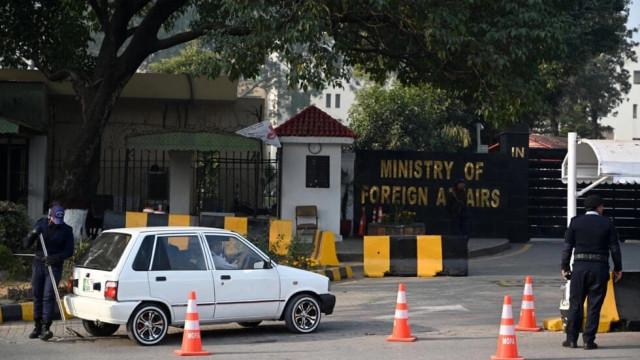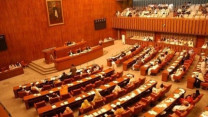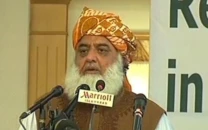MOFA accused of Apostille law breach
IHC issues notice as petitioner highlights treaty breaches

The Islamabad High Court (IHC) has issued notice to the Ministry of Foreign Affairs (MOFA) along with several others after it was apprised that MOFA was not only violating the Apostille Convention – an international treaty – but ignoring the alleged corrupt practices at one of its liaison offices, it emerged on Monday.
IHC’s Justice Babar Sattar while issuing notices to MOFA and other respondents has sought para-wise comments within a fortnight. Petitioner, Advocate Mansoor Hassan Khan, approached the court after MOFA refused to register a document duly apostilled by the secretary of state of Michigan, United States of America.
The petitioner has made MOFA through its secretary, chief secretary Punjab, senior member of Board of Revenue Punjab, deputy commissioner Lahore, and the sub-registrar Lahore, as respondents.
He took the respondents to court after they refused to register a surrender deed, saying the U.S authorities had issued apostilled documents concerning the gift of a share in a property by the petitioner and his brother to their sister.
Pakistan ratified the Apostille Convention – The Hague Convention abolishing the requirement of legalization for foreign public documents of 1961 – on July 8, 2022. The Apostille Convention became enforceable in Pakistan on January 26, 2024, through the promulgation of the Apostille Ordinance, 2024; it was later on extended on May 14, 2024; and eventually became an act of Parliament on September 6, 2024.
The foreign office’s website also states that Pakistan has acceded to Hague Convention, stating foreign public documents authenticated by apostille can be directly presented to the concerned authorities without any other attestation requirement.
In line with the obligations as contracting state of the Convention, it adds, concerned authorities of Pakistan will now accept the Foreign Apostille Certificates issued by the members/contracting states of the convention from the date of entry into force i.e. March 9, 2023, without any requirement of attestation from Ministry of Foreign Affairs or Pakistan Missions abroad.
However, on June 6, the petition reads, Mansoor requested the sub-registrar for registration of the apostilled document under the Registration Act of 1908 but he refused, saying the apostilled documents were neither legalized by the Pakistan embassy in Washington nor attested by MOFA in Pakistan. Mansoor apprised him that it wasn’t required under the law but to no avail.
Subsequently, Mansoor sent an email to the foreign secretary and requested him to discharge his legal and constitutional duties, adding that he also informed the official about the alleged corruption in the Lahore office of MOFA taking place on account of his dereliction of duties.
“The Lahore Office of MOFA continues to attest foreign documents although this requirement was abolished under the new law,” Mansoor stated in the petition, “This is nothing but corruption at the Lahore office of MOFA.” He added MOFA neither responded to the allegation nor took any action.
Afterwards, the petition reads that a formal legal notice was served on foreign secretary about the illegality being committed by the sub-registrar in breach of the Apostille law. The petitioner also sent legal notices to other respondents for not registering the documents and insisting that the same should be legalized by Pakistan embassy in Washington and MOFA.
Shocking as it may seem, Mansoor revealed in the petition that when he sent his attorney to MOFA Lahore, the attorney noticed that agents outside the office were openly charging between Rs75,000 to Rs150,000 for getting Pakistani public documents apostilled within two hours. Currently, it has been observed that MOFA takes days in completing the process.
Under para 282 of part 5 of the Apostille Handbook, Mansoor maintained that “Each contracting party is obliged to give effect to Apostilles, whether paper or electronic, that have been issued by other Contracting Parties in accordance with the Convention…”
After the enactment of the Apostille Act, he added, Pakistan is bound by the Apostille Convention to accept document, saying “refusal to register or recognize the Apostilled Documents of a contracting state is not only a breach of the Apostille Act, but also a breach of the Convention that Pakistan has signed and ratified.”
Publically, he added, MOFA accepts the abolition of the requirement of legalization of foreign public documents, however, in practice it undermines Pakistan’s commitment made to the comity of nations by not waving the requirement of legalization by its foreign missions.
Mansoor has prayed the court to issue directions that the apostilled documents do not require further legalization by the Pakistan mission in USA or attestation by MOFA in Pakistan, thus opening the way for them to be registered.
The petitioner has also prayed to instruct MOFA to urgently issue the required instructions under the Apostille Act to all the provinces and Islamabad so that the Pakistani expatriates community, which each year contributes more than USD30 billion to the economy of Pakistan, is saved from further humiliation, saying they should be saved from “humiliation” and the members of this community do not have to pay “bribes” for acts which are absolutely legal and aboveboard.
He also sought an inquiry against those involved in corrupt practices and misconduct at its Lahore office.



















COMMENTS
Comments are moderated and generally will be posted if they are on-topic and not abusive.
For more information, please see our Comments FAQ